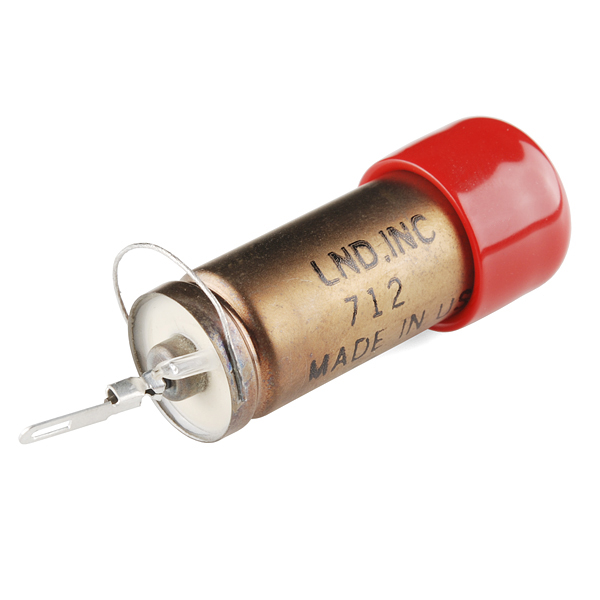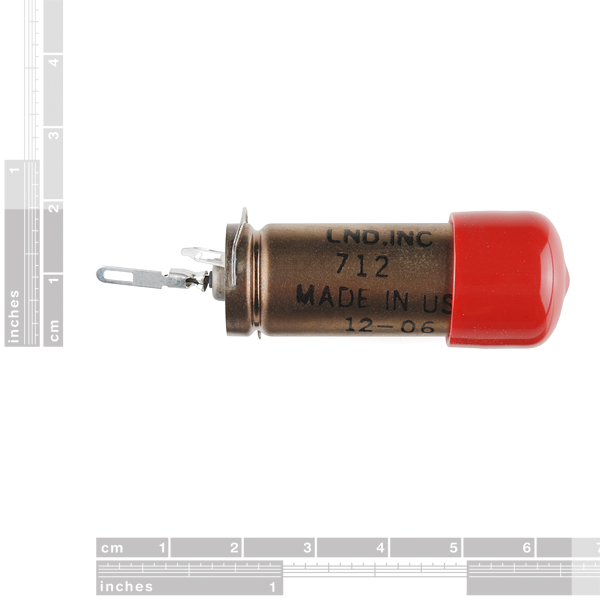Geiger Tube
Need to test for nuclear fallout? Geiger tubes are the sensing elements of Geiger counters, which are used to measure ionizing radiation. This tube is made of a thin-walled stainless steel and is filled with a mixture of Neon and Halogen gases at low-pressure.
You'll need a large voltage to get the Geiger tube to going - 325VDC minimum, 500VDC recommended. If ionizing radiation passes through the tube, short pulses of current will flow from the negative electrode to the positive electrode to be measured or counted. Check out the datasheet below for an application circuit.
This is the same tube used on our Geiger Counter development board.
This product is controlled for export by the United States. Sending it to other countries may still be possible, but will require additional information prior to shipment.
- Length: 1.94" maximum
- Diameter: 0.59" maximum
Geiger Tube Product Help and Resources
Core Skill: Soldering
This skill defines how difficult the soldering is on a particular product. It might be a couple simple solder joints, or require special reflow tools.
Skill Level: Noob - Some basic soldering is required, but it is limited to a just a few pins, basic through-hole soldering, and couple (if any) polarized components. A basic soldering iron is all you should need.
See all skill levels
Core Skill: Electrical Prototyping
If it requires power, you need to know how much, what all the pins do, and how to hook it up. You may need to reference datasheets, schematics, and know the ins and outs of electronics.
Skill Level: Noob - You don't need to reference a datasheet, but you will need to know basic power requirements.
See all skill levels
Comments
Looking for answers to technical questions?
We welcome your comments and suggestions below. However, if you are looking for solutions to technical questions please see our Technical Assistance page.
Customer Reviews
5 out of 5
Based on 1 ratings:
Detects Alpha radiation from end window
I used this tube with radiation monitor electronics from Ukraine (Arduino and LCD shield plus voltage source). Made a 3d printed enclosure for the tube and electronics. Works great, detects lots of Alpha radiation from an old Coleman lantern mantle. Also registers other stronger types of radiation through the sides of the tube. In everyday use, probably just keep the red vinyl cap on unless looking for Alpha radiation. The mica window is not clear as in some other tubes, this one has an Aquadag like coating.



Dangit - I just placed an order now I see this. Please stop it. Too many toys. Too many fun things to play with. Not enough time - and certainly not enough money.
You are making my wife very unhappy :)
Scott
This tube has aquadag coated thin mica window at the end of the tube opposite the termination. This window is for detection of alpha and beta particles. The window will appear to be slightly concave as the pressure in the tube is less than atmospheric (~0.1 Atm). The window is extremely fragile, touching it will likely convert your tube to an ornament, wasting your $94!
http://en.wikipedia.org/wiki/GM_tube
Actually, the specs on the tube at the LND site say that this is an alpha-beta-gamma sensitive part- there's a mica window at the far end that will let alphas through.
this is cool
Would this detect radon gas ?
Afraid to breathe
It would detect radon gas. Radon detection kits are much cheaper though.
What do the $10 radon detection kits use then?
Most of those cheap kits are passive, requiring you to send in a sample to a lab (which is not as cheap). I haven't seen an off-the-shelf monitor type that's cheap, but there are some DIY projects based on ion chambers (read: coke can - here's a nice detailed one Make a Cheap and Effective Radiation Detector ( Ion Chamber ). Just don't expect it to perform on the same level, or with the same accuracy, as the commercial products.
It could detect the radiation from radon gas, and it might be possible to figure out that the gas was radon based on the radiation.
Radon undergoes alpha decay, in which it releases an alpha particle. This Geiger tube cannot detect alpha particles, only beta and gamma radiation. You need a Geiger tube with a mica window to detect alpha particles.
The spec sheet calls this product an "End Window-Alpha-Beta-Gamma Detector" and says the window material is Mica.
It shows a graph for sensitivity to Gamma radiation, but doesn't include one for alpha or beta radiation.
I believe that this tube has a mica window on it from looking at a previous post.
I'll find out for sure soon enough when my order arrives.
If you use an electromagnet to bend the path of the beta particles to go into the Geiger M?ller tube, you can analyze the energy spectrum of the beta particles (By applying different magnetic field intensities different particles of certain energy levels will be deviated to the Geiger counter). With the spectrum you can identify the element emitting the radiation. To detect gamma radiation I would use a scintillator (Which I actually have).
Hi Manuel,
I would like to hear more about this (spectroscopy)...
saji
712! Can this be sent to Canada?
You guys ever thought about selling a low dose radiation source to go with this guy?
Sodium-Free Salt-alternative (Potassium Chloride) emits small amounts of beta radiation if I remember correctly... Also, I won't encourage you to take apart your smoke detector but most contain a small dot of americium-241, an alpha emitter (with weak secondary gammas)
Needless to say we can't exactly ship radioisotopes all over the place.
Until Sparkfun begins selling them, these guys (unitednuclear.com) sell uranium ore and radioactive isotopes that are relatively safe.
http://unitednuclear.com/index.php?main_page=index&cPath=2_5
Gotta low Bob Lazar!
Thanks for the project ideas
This is pretty cool and all,but what is the point?
well, its a sensor for detecting ionizing radiation. you need one if you want your project to be able to detect gamma rays! maybe you want to make sounds based off of cosmic rays, or need random data for cryptography. im sure a google search would find plenty of other projects involving them.
its a little pricey at 90 bucks though, i have a complete 'modern' russian geiger counter next to me that i got off ebay for 15 bucks. it was even calibrated, though the papers are in Cyrillic
I wouldn't trust anything off eBay if I were you.